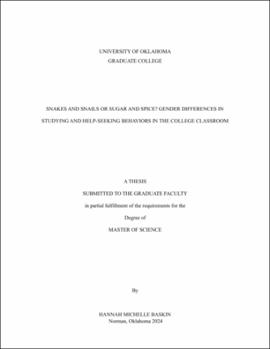| dc.description.abstract | College is a time of adjustment, particularly for first-year students. Although many students face challenges, research has suggested an increasing disparity in how well men and women adapt (Moore et al., 2010; Respondek et al., 2019). For example, women earn better grades and have higher retention and graduation rates relative to men (Duffin, 2021; Ewert, 2012; Marrs & Sigler, 2012). Although previous research has focused on gender differences in variables such as help-seeking and study strategies, we hypothesize that masculine identity may be more useful in predicting academic success. The current study employed structural equation modeling (SEM) to determine the influence of masculine ideology as a moderator between academic outcomes and several variables that have previously been associated with academic success, such as mindset, imposter phenomenon, study habits and help-seeking. We found that masculine ideology significantly moderated the relationship between the imposter phenomenon and study strategies such that individuals who experience the imposter phenomenon and also endorse a traditional masculine ideology are more likely to adopt shallow study approaches than those low in traditional masculine ideology, who are more likely to use deep study approaches. Furthermore, masculine ideology significantly moderated the relationship between imposter phenomenon and help-seeking, such that those who endorse a traditional masculine ideology tend to use executive help-seeking methods or avoid help-seeking altogether. However, those who do not endorse a traditional masculine ideology tend to use instrumental help-seeking methods, perceive more benefits from help-seeking, and attend office hours and tutoring more frequently. | en_US |
